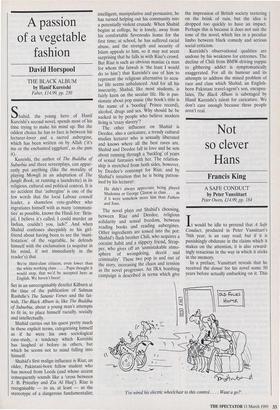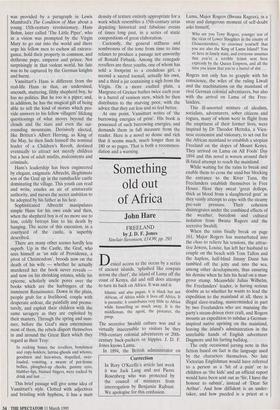Not so clever Hans
Francis King
A SAFE CONDUCT by Peter Vansittart Peter Owen, £14.99, pp. 184 It would be idle to pretend that A Safe Conduct, produced in Peter Vansittart's 76th year, is an easy read; but if it is punishingly obdurate in the claims which it makes on the attention, it is also reward- ingly tenacious in the way in which it sticks in the memory.
In a preface, Vansittart reveals that he received the donne for his novel some 50 years before actually embarking on it. This `I've wired his electric wheelchair to this control . . . . Want a go?'. was provided by a paragraph in Lewis Mumford's The Condition of Man about a young 15th-century revolutionary, Hans Bohm, later called 'The Little Piper', who in a vision was prompted by the Virgin Mary to go out into the world and there urge his fellow men to eschew all extrava- gance, hold their property in common, and dethrone pope, emperor and prince. Not surprisingly in that violent world, his fate was to be captured by the German knights and burnt.
Vansittart's Hans is different from the real-life Hans in that, an undersized, uncouth, stuttering, filthy shepherd boy, he has no politics. But he too is a piper; and, in addition, he has the magical gift of being able to tell the kind of stories which pro- vide answers to his fellow villagers' lifelong questionings of what moves beyond the clouds and the stars and even the sur- rounding mountains. Derisively elected, like Britten's Albert Herring, as King of the May, he then finds himself the nominal leader of a Children's Revolt, destined eventually to attract not merely children but a host of adult misfits, malcontents and criminals.
Hans's leadership has been engineered by elegant, enigmatic Albrecht, illegitimate son of the Graf up in the ramshackle castle dominating the village. This youth can read and write, exudes an air of aristocratic authority, and nurses the secret ambition to be adopted by his father as his heir.
Sophisticated Albrecht manipulates simple Hans for his own ends and then, when the shepherd boy is of no more use to him, coldly betrays him to his death by hanging. The scene of this execution, in a courtyard of the castle, is superbly described.
There are many other scenes hardly Iess superb. Up in the Castle, the Graf, who sees himself as 'an axle of Providence, a pivot of Christendom', broods now on the death of his wife — whether he actually murdered her the book never reveals and now on his shrinking estates, while his epicene, scholarly uncle pores over the books which are the harbingers of the imminent Renaissance. Down in the plain, people grub for a livelihood, couple with desperate ardour, die painfully and prema- turely, and exploit their children with the same savagery as they are exploited by their masters. Through the spring and sum- mer, before the Graf's men exterminate most of them, the rebels disport themselves in and around the Great Barn which they regard as their Troy: In reeking fumes the revellers, bondsmen and copy-holders, latrine-ghouls and whores, goodmen and hen-wives, stupefied, over- loaded, vomiting, a swarm of pot-house bellies, ploughed-up cheeks, gummy eyes, blubber-lips, blained fingers, were rocked by drink and lust ...
This brief passage will give some idea of Vansittart's style. Clotted with adjectives and bristling with hyphens, it has a matt density of texture entirely appropriate for a work which resembles a 15th-century arras depicting historical and fabulous events of times long past, in a series of static compositions of great elaboration.
Curiously, the general stiffness and sombreness of the tone from time to time relaxes to produce a passage not unworthy of Ronald Firbank. Among the renegade revellers are three youths, one of whom has sold a footprint to a credulous girl, a second a sacred toenail, actually his own, and a third a jar containing a sigh from the Virgin. On a more exalted plain, a Margrave of Greiser bathes twice each year in a barrel of venison stew, which he then distributes to the starving poor, with the advice that they eat less and so feel better.
At one point, Vansittart writes of 'the burrowing energies of print'. His book is possessed of such burrowing energies, and demands them in full measure from the reader. Here is a novel so dense and rich that it seems much, much longer than its 180 or so pages. That is both a recommen- dation and a warning.



























































 Previous page
Previous page